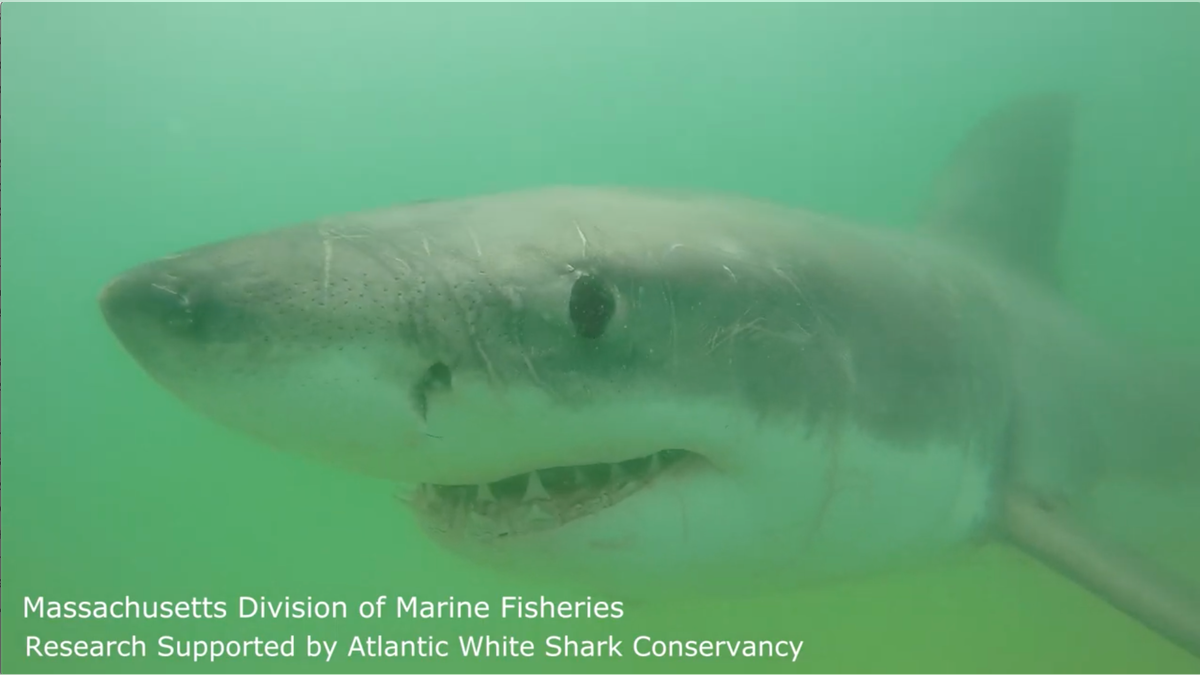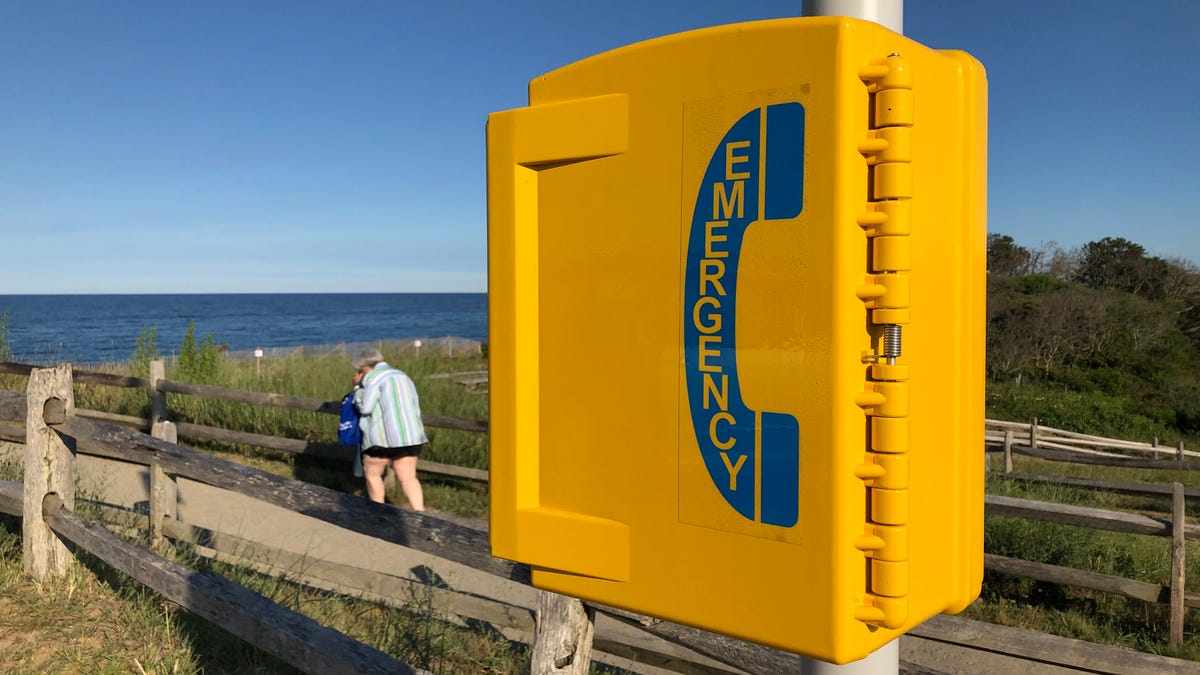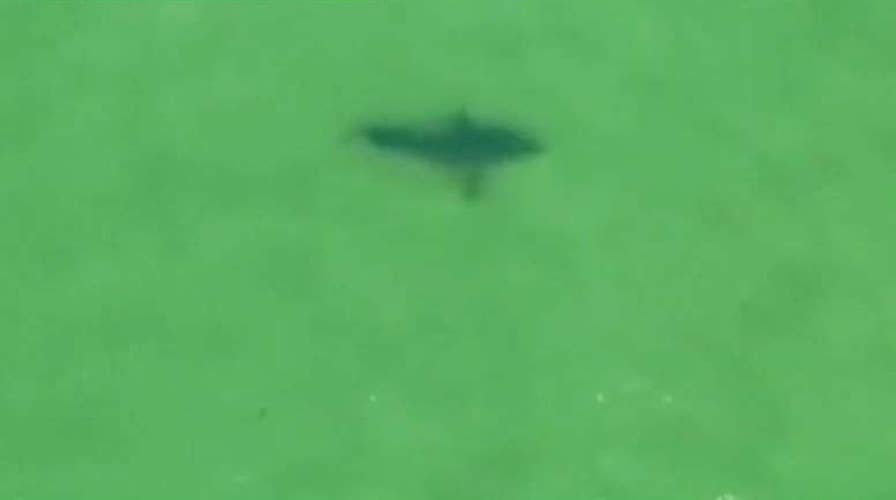Cape Cod experiencing a shark surge
A spike in shark sightings off the coast of Cape Cod has alarmed swimmers, keeping them close to shore.
ORLEANS, Mass. — Dozens of sharks have been spotted lurking in the shallow waters off of Cape Cod in Massachusetts.
Over 30 sightings were reported along the Cape in the past week alone, according to data from the Atlantic Great White Conservancy's app Sharktivity.
After three swimmers were bitten last month off the coast of North Carolina, swimmers are staying in shallow water, if they even dare go in. Also fresh on the minds of many people on Cape Cod: the death of a 26-year-old man last September following a great white shark attack — the region's first fatal shark encounter in over 80 years.

A great white shark spotted by researchers off the coast of Cape Cod. (Mass. Division of Marine Fisheries and the Atlantic White Shark Conservancy)
"We don't swim out like we used to, because the sharks are coming in pretty close," said Deborah Molinari, who said she has visited Cape Cod nearly every summer since she was a little girl.
SHARK SWALLOWED WHOLE DURING RARE DEEP-SEA FEEDING FRENZY OFF SOUTH CAROLINA COAST, VIDEO SHOWS
While the chances of getting bitten by a shark are extremely slim, the slew of great white sightings so close to shore has first responders along the beach preparing for the worst.
"This problem has intensified over the last decade. We're really taking an aggressive posture this year," said Anthony Pike, fire chief in Orleans, Mass.
Orleans is one of the first coastal towns in the country to install severe bleeding kits along the beach, along with emergency call boxes on remote beaches where there may not be any cell service, Pike said. In addition to bold new signage, stepped-up safety protocols and new communication towers, Pike said the mentality on the island is also changing.
MYSTERIOUS DEEP-SEA SHARK THAT'S OLDER THAN THE DINOSAURS CAPTURED ON FILM
"People are no longer incredulous to the potential danger," Pike said. "We're seeing a cultural change across Cape Cod to educate the public, to stay close and shore to swim responsibly."

The National Park Service recently installed emergency landline call boxes on Nauset Light Beach, parts of which have weak or no cell service. (Rob DiRienzo / Fox News)
The reason the sharks are coming so close to shore, marine biologist Greg Skomal said, is food.
"What we've got going on here now is we've got this classic predator-prey relationship with the sharks and the seals," Skomal said. "The seals are close to shore. The sharks are moving close to shore in order to eat the seals, and then we've got people in the mix."
Skomal and his team go out looking for sharks a few times a week, tagging them with trackers to keep tabs on their movements and to study their behavior. Last week, they captured a remarkable interaction between two great whites by drone.
He said the reason for the population boom of grey seals is their federally protected status granted by the Mammal Protection Act of 1972, which banned killing the seals. They have made a roaring return in the decades since, to the pleasure of the great whites and to the concern of humans.
GREAT WHITE SHARK STUNS FISHERMAN DURING REAL LIFE ‘JAWS’ MOMENT
Even if the legal protection was removed, Skomal questions if anything would change.
"How many seals do you possibly remove? What do you do with them?" Skomal said. "And with a population of half a million in the Northwest Atlantic, will it be effective at all?"
He added that great white sharks' instinct is to hunt for the seals, and human attacks are very rare. Last year, of the 66 shark attacks worldwide, only four were deadly.
CLICK HERE TO GET THE FOX NEWS APP
"The probability of getting hurt in your car is far higher than getting hurt by a shark," Skomal said, "but doesn't stop any of us from using our cars every day."









































